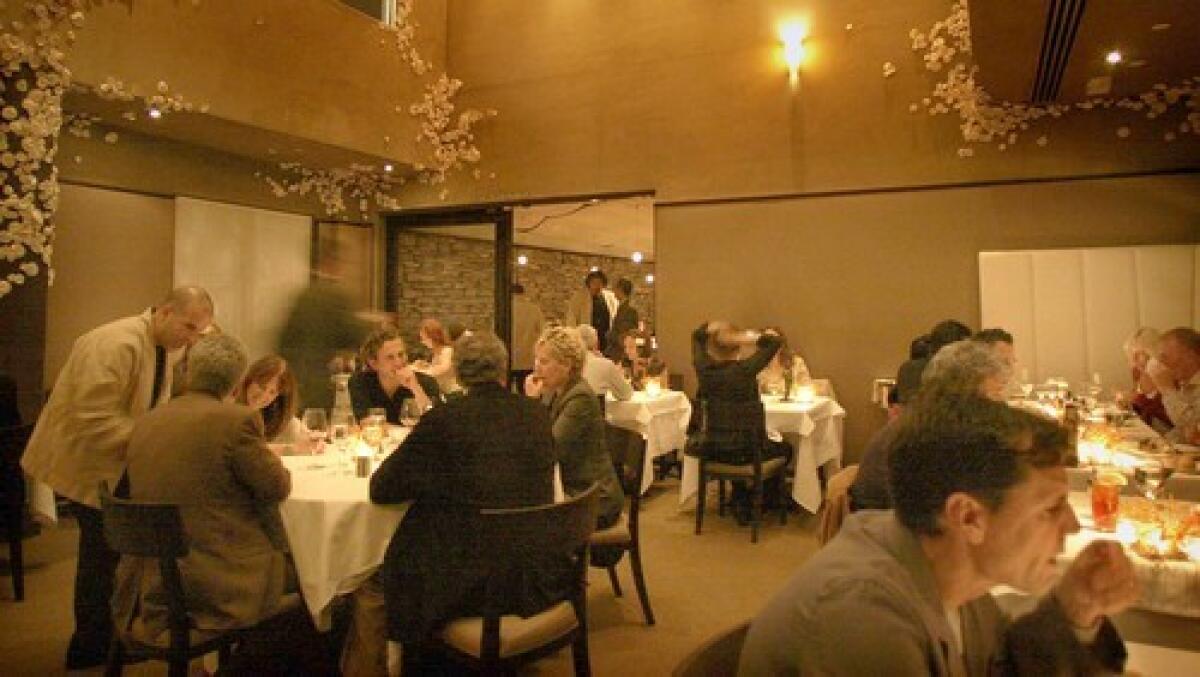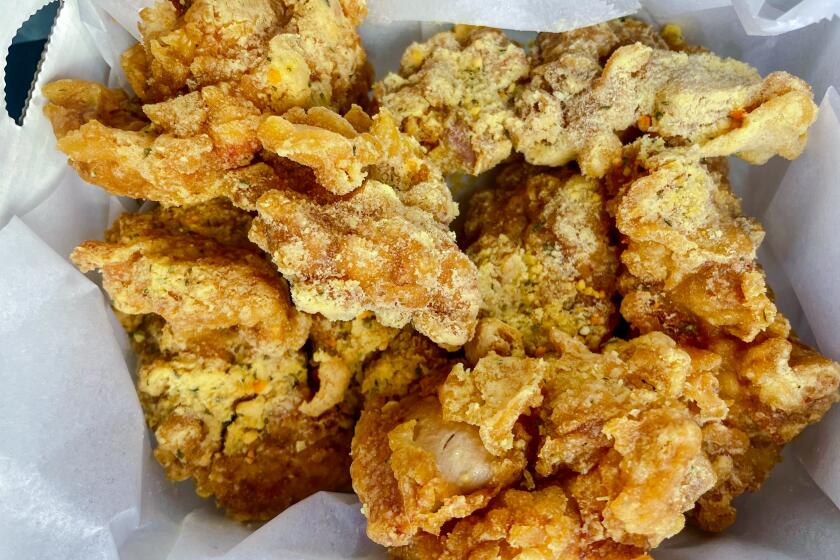A chef’s vision, crystal clear

French chefs always say that seafood is much more interesting and challenging to cook than meat. It’s the difference between playing an instrument with a range of an octave or two and one that encompasses a slew of notes. At Providence, the most ambitious new restaurant to open in Hollywood in a long, long time, chef Michael Cimarusti is busy proving that fish trumps meat almost every time.
First argument: medallions of Colorado River salmon, its flesh a deep rose and broadly striped. Barely seared, the fish is one step this side of raw, garnished with the transparent, highly perfumed shavings of matsutake mushroom and served with a drop of ethereal citrus sauce. The delicate mushroom against the rich satin of the salmon rings like a bell.
The chef may follow with a bite of spiny lobster -- just coming into season now -- on a pedestal of Weiser Farms green melon, and then kick it up with an exquisitely balanced vanilla sauce. The miniature beer mug next to it, just big enough for a couple of sips, holds a cool, fruity melon soup that adds a graceful coda to the main theme.
A Santa Barbara prawn arrives butterflied, still half in its shell, with the head split and broiled. It’s strewn with its coral-red roe, like beads that have spilled from a necklace, and the tiniest most delicious ochre shimeji mushrooms. Cimarusti allows the prawn to star, pairing it with only a subtle sake sauce. It’s a fabulous dish, a few bites really, but the sweetness and custardy texture of the barely cooked prawns resonates. Nothing is overdone, yet each of the flavors rings true.
The opposite of stuffy
CIMARUSTI has done his time. After six years behind the stoves at Water Grill, the 35-year-old chef was more than ready for his own restaurant. Providence, named for the New England city where he spent summers as a kid, occupies a space with its own history: the original Patina on Melrose Avenue just east of Highland.
Candles waver behind spiky beaded stalks that look like sea urchin tentacles. The walls are covered in chocolate brown fabric and encrusted with handmade porcelain blobs that could be barnacles (or some primitive sea creature you could eat). On the sleek white leather banquette, couples slide close together, stealing bites of Japanese tai snapper or Long Cove oysters off each other’s plates. A woman sommelier wearing a silver gardenia brooch pours a pretty rose Champagne into flutes for a table celebrating a birthday, while a group of men settles in at the center table with an air of anticipation. Pulling high-ranking bottles of Burgundy from their bags, they’re ready for whatever Cimarusti sends their way.
Though you can detect the bones of Patina behind the modest makeover, this feels very different. For one thing, Providence is the opposite of stuffy. Look around: Everyone seems relaxed and delighted to be here. Not all the men are garroted into neckties; nor does everyone wear a jacket. It’s not a restaurant with a scene, at least not yet. Thankfully, it’s all about food.
Providence is not Water Grill redux either. It seemed clear that Cimarusti had been itching to break out of the Water Grill format for some time. He had a great run there, though, and turned what had been a moribund seafood house into one of the best seafood restaurants in the country. He’s had his foam phase. He’s pretty much done with sweet sauces. In the course of his tenure there, he tried everything from grilling loup de mer over dried fennel stalks to cooking fish slow and easy.
Now that he doesn’t have to satisfy the convention-goers or the business crowd popping in for a quick lunch, he can let loose in the kitchen. The most exciting dishes are to be found on the nine-course market menu, which changes almost daily. That’s where he experiments with a fish just flown in from Japan, say, or tries out an idea or combination of ingredients that’s just occurred to him. It could be a slender slice of turbot crossed with an inch-wide sash of the gelatinous, delicious fin, playing up the contrast with the snowy flesh of the turbot. The tasting-menu format allows the chef to be more spontaneous and in the moment. And it’s certainly where I’ve had his best cooking in the three months Providence has been open.
Each dish on the market menu arrives beautifully plated. Small soft-shell crabs are stacked tall like onion rings and crowned with a thin bracelet of dried lipstick pepper. They’re juicy, with that sweet, ineffable blue crab flavor. No exotic spices for this guy or these crabs. He has them sitting on a sort of corn succotash with whole corn kernels and lipstick peppers in a corn puree flanked by two stripes of red pepper sauce and shaved Marcona almonds from Spain.
Cimarusti left Water Grill in July 2004. Providence opened the last week of June this year. In the interim, relieved from the pressures of cooking every night, Cimarusti had the luxury of time to think and recharge. As a result, his cooking has taken a huge leap forward. He also lost 80 pounds, and though he’s been working practically 24/7 since the restaurant opened, when you see him step into the dining room to say hello to friends, he looks crazy happy.
Funny thing, the food at Providence was good right out of the box, which is unusual. And with every visit I’ve made over the last few months, Cimarusti’s cooking has taken on a sharper focus. The ideas are fresh, the execution, for the most part, dead-on.
The kitchen is state-of-the-art, inherited from Patina’s last remodel. Cimarusti is cooking for fewer diners than he did at Water Grill, and at Providence he doesn’t have to write a menu to please everybody. It’s as if his creativity has been let off the leash, free to roam and to take chances on what people will and will not eat.
I love the fact that he has a salad of squid and pigs’ ears on a little arugula and frisee as a first course on the regular menu. I don’t know how many people order it, but it’s there. And it’s wonderful: The pigs’ ears, julienned into ribbons, have a rich, unctuous flavor and a slight crunch that is marvelous against the tender squid. He’s brought his delightful chowda’ along, too, made with the tiniest, sweetest clams, fingerling potatoes, apple-smoked bacon and, pulling all the stops out, straight half and half. Trouble is, it’s so rich with all that cream, if you finished the bowl, you’d never make it to the cheese course.
Few L.A. chefs would put on the menu a risotto made with chicken “oysters” (those delicious little nuggets right next to the backbone), fresh crayfish tails, dusky chanterelle mushrooms and pea shoots for some color. Another of blue crab and sea urchin flavored with vermouth and a little lemon is terrific, too. He’s really made risotto his own.
Land and sea fare
THOUGH seafood is the theme, the kitchen throws an occasional bone to the meat lovers in the crowd, such as a pork belly appetizer. The thick slice streaked with fat and lean melts in your mouth; the caramelized crust tastes as if it’s been braised in sweet black Chinese vinegar. Or a Wagyu (Kobe-style) beef rib-eye escorted by a dainty bone marrow sandwich that could go to a doll’s tea party.
Or there might be a Muscovy duck breast with kumquats that add a sweet, bitter taste that cuts through the richness of the bird, and a garnish of finely diced celery and celery leaves.
Though Cimarusti has always had a great eye, he seems to be struggling with the main courses from the a la carte menu. They tend to look too labored over, as if he can’t think what to do to fill that expanse of white plate. Presentations start to get fussy and occasionally don’t look that appetizing. For example, New Bedford scallops and a single cauliflower-bacon raviolo are practically embroidered with garnishes, dibs and dabs of this and that, including tiny cauliflower florets. The effect is over the top.
Cimarusti’s partner and general manager is Donato Poto, last seen running Bastide. He’s engaging and interesting, conscious of how long to stay at a table, and when to go. For some unknown reason, waiters at L.A.’s “fine dining” restaurants tend to adopt the stiff elocution of undertakers. But here, most are professional and talk like normal human beings. The ghost of Patina past must be lingering somewhere here, though, whispering phrases in some of the waiters’ ears. The occasional “absolutely,” or some such annoying waiter-speak slips out. One waiter insisted on calling the women at our table “madame” in a put-on French accent.
The smaller and cozier back dining room looks onto the wine cellar, which is so large that this fledgling restaurant hasn’t been able to entirely fill the racks. Even so, the choices on the 35-page wine list are interesting and, even more unusual for a restaurant of this caliber, extremely fairly priced. There’s something on the list for everybody, including a Savennieres from Domaine Nicolas Joly, a Condrieu from Guigal or the Riesling “Polish Hill” from the Australian producer Grosset, all of which are fine accompaniments to fish. Corkage is reasonable, too. And for those who want to start their meal with something from the bar, the resident mixologist whips up some killer cocktails.
Desserts from pastry chef Tim Butler are well-executed, but less original than the rest of the menu. They’re also quite sweet and terribly fussy. I did enjoy the round almond cake crowned with luscious purple figs in a puddle of Banyuls, the southern French dessert wine, which added something dark and complex. Pain perdu (“lost bread”) is a beguiling take on French toast, served with a poached apple and vanilla ice cream. The chiboust is served with an intensely herbal, almost medicinal tarragon ice cream that may not be to everyone’s taste.
The little sweets at the end of the meal, though, are a treat. There are homemade marshmallows, dark, fragrant chocolate truffles made from cacao beans the pastry chef roasts himself, and baby madeleines.
Just when fine dining seems to be out of fashion in Los Angeles, it’s thrilling to find a young chef with the moxie and the talent to envision something new with seafood as his medium. This, I promise, is one worth a detour.
Providence
Rating: ***
Location:
5955 Melrose Ave., Los Angeles; (323) 460-4170; www.providenceLA.com.Ambience: Contemporary seafood restaurant with a relaxed, lively atmosphere, a bar with a passionate mixologist, and a devoted following for Michael Cimarusti’s cooking.
Service: Personable and professional.
Price: Appetizers, $15 to 24; main courses, $32 to $38 (lobster is market price); desserts, $11 to $12; chef’s California Coastline menu, $90 per person; market menu (full, $90 per person; five-course, $70 per person).
Best dishes: Clam chowda’, squid with pigs’ ears and piquillo pepper, risotto with crayfish and chicken oysters or sea urchin and blue crab, pork belly, spot prawn with shaved matsutake mushrooms, duck breast with kumquats, prime rib-eye with bone-marrow sandwich, almond cake with caramelized figs and Banyuls.
Wine list: A work in progress impressive for the breadth of choices at all price levels. Corkage, $15 for first bottle; $25 for second bottle (two-bottle maximum).
Best table: The corner table to the left inside the door.
Details: Dinner 6 to 10 p.m. Monday through Saturday. Starting Oct. 16, also dinner Sunday 5:30 to 9:30 p.m. and lunch Wednesday through Friday, noon to 2:30 p.m. Full bar. Valet parking, $4.50.
Rating is based on food, service and ambience, with price taken into account in relation to quality. ****: Outstanding on every level. ***: Excellent. **: Very good. *: Good. No star: Poor to satisfactory.
More to Read
Eat your way across L.A.
Get our weekly Tasting Notes newsletter for reviews, news and more.
You may occasionally receive promotional content from the Los Angeles Times.










